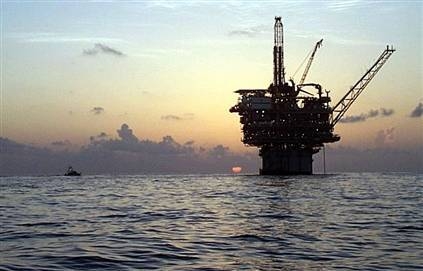Explorers will very likely find substantial quantities of natural gas and possibly oil off the Lebanese coast, according to a top executive at a Norwegian company carrying out the first 3-D seismic survey of Lebanon’s offshore deposits.
“You will never know [how much gas there is] until you drill a well under the sea, [but] you can make an assessment from the site we surveyed,” Spectrum CEO David Rowlands told The Daily Star. “Our assessment indicates so far there is a significant volume of gas to be discovered, and maybe even oil.”
Rowlands said the company would soon begin a 3-D survey in order to better determine the quantities of gas and oil off the Lebanese coast.
Spectrum already carried out a 2-D seismic survey off the Lebanese coast in 2000, as well as a second one in 2002.
Spectrum is carrying out the 3-D survey in collaboration with the Norwegian company Dolphin Geophysical, which is providing its high-capacity seismic vessel, M/V Polar Duke.
Both companies have said that the survey would acquire a minimum of 1,500 square kilometers of 3-D data.
The survey is the first stage of a project that will generate up to 3,000 square kilometers of data when completed, Spectrum said.
The survey has been fast-tracked to conclude in September, and the data will start to be made available to the government of Lebanon and other interested clients by November, according to Spectrum .
The final set of data will be completed in early 2013, which is when the Lebanese government has said it will open its first licensing round.
Dolphin said in a press release that the mobilization and acquisition would start imminently and fit well with the schedule for Polar Duke’s voyage to a previously announced contract in East Africa, which will commence in early October 2012.
Energy and Water Minister Gebran Bassil has said that tenders for oil companies could start at the end of this year or early next year once a technical oil committee is formed.
The seven-member committee is expected to be formed as early as September, Bassil’s adviser told The Daily Star.
Rowlands stressed that all the data would be passed to Lebanon’s Energy Ministry, which in turn would offer it to interested oil companies.
“Our contract with the ministry covers up to 3,000 square kilometers off the Lebanese coast, and our survey will be confined to areas within the recognized Lebanese territorial waters,” Rowlands added.
Rowlands said Spectrum would focus its survey on the exclusive territorial waters of Lebanon and would avoid the disputed economic maritime waters near other countries.
“We will not be acquiring data from any disputed waters,” he said.
The area which Spectrum is acquiring is the southwest corner. The survey will start 60 kilometers off the Lebanese shore and extend to the area near the maritime border with Cyprus.
“We anticipate to have our data available by the end of this year or early next year. The contract allows us to provide copies of the data to interested companies from America, Europe and the Far East. The aim is to get as many companies as possible [vying for tenders], and then they will apply to drill for gas,” Rowlands explained.
Rowlands said several international companies had already shown keen interest in extracting Lebanon’s oil and gas, saying that the discovery of deposits prompted a “stampede to explore the deepwater of the Levantine Basin.”
He added that Shell, BP and a number of other global firms had voiced interest in drilling.
Lebanon’s offshore area covers a total of 22,730km2 in the Eastern Mediterranean and has never been previously licensed for hydrocarbon exploration, according to the Energy and Water Ministry’s website.
“The recent deepwater, sub-salt gas discoveries to the south and west, which encountered high quality Lower Miocene sands, have significantly increased the industry interest in Lebanon and the Eastern Mediterranean. The Levantine basin within the Eastern Mediterranean region is [believed] to contain some of the most exciting exploration plays in the region which are being re-evaluated through advances in seismic technology,” the website says.
It adds that the Levantine Basin is a large deep basin estimated to contain more than 10,000 meters of Mesozoic and Cenozoic sediments.
“The basin contains all the key elements for successful hydrocarbon exploration with deepwater hydrocarbon plays within the Tertiary (Miocene/Oligocene sands) anticlinal structures enhanced by large potential stratigraphic traps. Nearer to shore, in relatively shallower water, hydrocarbon leads have also been recognized in the basin margin invoking new petroleum systems,” the ministry said.
Experts say it will take a minimum of five years until companies start extracting gas and oil off the Lebanese coast if everything goes according to plan.
The Daily Star
23 August























































